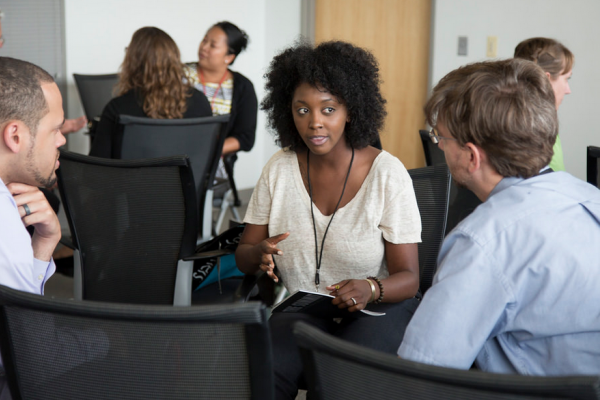The work we do in the nonprofit sector is complex and multifaceted. Often we find ourselves compartmentalizing our identities based on the work we’re currently doing. Am I a woman, an organizer, an African American, a facilitator, a Roman Catholic, a philanthropist, or a manager? And which of those is most important to the success of my work?
The Summit, hosted by Sojourners, is a unique opportunity to rise above some of these identity markers and practice being as holistically authentic as we can. Over 300 leaders committed to changing the world through faith and justice gathered in June in Washington, D.C., for a three-and-a-half day exploration of the particular ways that faith leaders impact a range of social justice issues. NCRP facilitated a private conversation for nearly 2 dozen philanthropic leaders who attended The Summit to consider the role that philanthropy plays in this process.
During our conversation about the interplay of faith, philanthropy, and justice, I heard opportunities for philanthropy that echoed the lessons I’d heard throughout The Summit. The speakers’ presentations offered an implicit challenge to be clear, as often as possible, not only about what we do to promote justice, but also why we, as individuals, do it. Throughout The Summit, speakers shared personal stories that went beyond the usual question, "How did you get involved in this work?"
As I reflect on speakers’ experiences of being abused by police officers, illegally detained in solitary confinement, or the difficult choice to leave a church community because of its racism, my respect for them grows stronger. Their core lesson, however, was how to draw from these experiences to anchor our work and motivate us to focus on ambitious, long-term goals.
The speakers’ experiences also pulled them through moments of discouragement in their work. During The Summit, breaking news poured in about the murders at Mother Emanuel A.M.E. Church in South Carolina. Several members of a panel on moral injury included a reflection on the murders in their remarks — a crime that challenged their resolve, their beliefs, and their faith. One speaker’s remarks moved me to tears as she discussed the experience of despair that trauma can have, and inspired me to hope as she shared her own meditation for overcoming such trauma. The panelists demonstrated the power of acknowledging the sometimes painful nature of consistently working on social justice, and the resolve that can result when leaders draw from their motivations and faith to continue working.
Another lesson from The Summit is the necessity of raising tough questions and offering specific answers to solutions. The philanthropy discussion included a realization that we don’t always discuss the full range of experiences that motivate our work, nor do we readily share the entirety of our ideas about achieving social justice with our peers in philanthropy. The group wrestled with that reality and explored perceived obstacles to having such conversations more often. We discussed who among us might convene or encourage such conversations in the future. In other sessions, a few moderators asked what philanthropy can do to specifically support current exciting social justice efforts. I was struck by how many panelists had vague answers to that question, almost as though they expected that institutional philanthropy would not be much help for what they are doing. Why might that have been the case?
We certainly don’t lack ideas or motivation in philanthropy to tackle tough societal problems, but it seems we would benefit from an added dose of courage. Courage to be more explicit about our personal experiences with the issues we address in our work. Courage to be more forthcoming about our ideas for solutions. And courage to have higher expectations of our sector. The Summit was a unique convening where that type of courage could take shape and be explored. We need to continuously look for ways to bring these lessons, and the courage to implement them, into our ongoing work in philanthropy to achieve lasting change.
Jeanné Isler is the field director at the National Committee for Responsive Philanthropy (NCRP). Follow @NCRP and @j_lachapel on Twitter.
Got something to say about what you're reading? We value your feedback!
